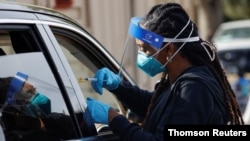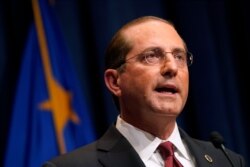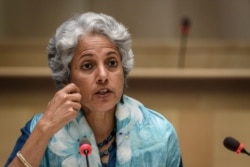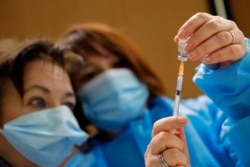The United States is changing vaccine strategies, releasing millions of COVID-19 vaccine doses it was holding back for use as second shots to inoculate Americans older than 65, as well as those with underlying health conditions.
Appearing on a morning news show, Health and Human Services Secretary Alex Azar said, "The administration (of vaccines) in the states has been too narrowly focused."
"We now believe that our manufacturing is predictable enough that we can ensure second doses are available for people from ongoing production," Azar told ABC's Good Morning America. "So, everything is now available to our states and our health care providers."
He said the new strategy would not interfere with Americans waiting for a first dose.
While COVID-19 cases continue to spike across the United States, many state leaders are showing reluctance to order further lockdowns.
Most notable is New York Gov. Andrew Cuomo.
“We simply cannot stay closed until the vaccine hits critical mass. The cost is too high. We will have nothing left to open,” Cuomo said this week.
Governors in other states were expressing similar concerns, The Associated Press reported.
Meanwhile, the World Health Organization is warning that mass vaccinations against the novel coronavirus will not produce herd immunity this year.
WHO chief scientist Dr. Soumya Swaminathan told reporters Monday that it takes time to produce and administer enough doses of a vaccine to finally stop the spread of COVID-19. Swaminathan stressed the need for countries to continue observing mitigation efforts such as mask-wearing, social distancing and hand-washing.
In a related development, Moderna said its COVID-19 vaccine should provide immunity for at least a year. According to Reuters news agency, the company said during the annual J.P. Morgan Healthcare Conference Monday it was confident the messenger RNA technology it used was well-suited to deploy a vaccine based on the new variant of the coronavirus, which has emerged in a handful of countries.
Dr. Bruce Aylward, a WHO senior adviser, said Monday the agency is hoping to begin providing COVID-19 vaccines to the world’s poorest countries in February but said “we cannot do that on our own.” He urged vaccine makers to prioritize deliveries to the COVID-19 Vaccines Global Access Facility, or COVAX.
COVAX is an alliance of WHO, the Coalition for Epidemic Preparedness Innovations and Gavi, The Vaccine Alliance, an organization founded by Bill and Melinda Gates to vaccinate children in the world’s poorest countries.
In the United States, the Centers for Disease Control and Prevention said more than 9 million Americans had been given their first COVID-19 vaccination dose as of Monday morning. That is less than one-third of the total doses distributed to states by the U.S. government. States, not the federal government, are responsible for administering the vaccines to their citizens.
The CDC also said Monday that at least 72 cases of a more contagious variant of the coronavirus first identified in Britain have now been discovered across 10 U.S. states. California has the most with at least 32 cases, followed by 22 in Florida. The remainder are spread across Colorado, Connecticut, Georgia, Indiana, Minnesota, New York, Pennsylvania and Texas.
The British variant is one of three that have emerged from the original coronavirus, with the third just recently detected in Japan in travelers from Brazil. The Brazilian variant is different from the British and South African variants, but the three share a common mutation.
Russia announced Tuesday it was extending a ban on flights to and from Britain until February 1. Flights were suspended starting December 22, 2020.
Earlier, Britain said it has vaccinated 2.3 million people.
In Japan, officials said they are going ahead with planning for the delayed Tokyo 2020 Olympic Games, which are scheduled to start July 23.
There are more than 91 million global coronavirus infections, including over 1.9 million deaths. The United States leads the world in both categories with 22.7 million infections and nearly 380,000 deaths, according to Johns Hopkins University. India is second in total COVID-19 infections with more than 10.4 million cases.








